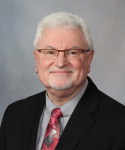Wright State University microbiology alumnus Mark Espy, a clinical researcher at the Mayo Clinic, helped develop a test to detect the presence of coronavirus in humans.
The clinical virology laboratory at the world-renowned institute produces about 1,000 tests a day. The tests give results in about 24 hours.
Headquartered in Rochester, Minnesota, the Mayo Clinic is one of the largest not‐for‐profit, academic health systems in the nation. With a focus on caring for patients with serious, complex illnesses, the clinic operates in five states and cares for more than 1 million people a year.
For many years, Espy has done molecular and PCR testing at Mayo. He and his colleagues were instrumental in developing real-time PCR for use in the clinical laboratory. PCR, or polymerase chain reaction, is a method used widely in molecular biology to make up to billions of copies of a specific DNA sample rapidly, enabling scientists to take a very small sample of DNA and amplify it to a large enough amount to study in detail.
Because of the experience Espy had gained from years of laboratory analyses, he was able to take the published genetic sequence of the coronavirus (COVID-19) and develop probes to detect it using PCR.
Espy said it was a difficult process.
“The program picked out what it believes are good sequences to use based on the parameters I have set. I then look at the chosen sequences and — based on my experience and intuition — I pick what I think are the best ones,” he said. “The sequences are then made to be ready for testing. The hard part was determining how well the sequences worked.”
Espy was able to find a patient who tested positive for COVID-19, enabling his team to determine the best primer/probes combinations to the chosen gene targets of the virus.
“From there, we were able to do all of the necessary testing to validate the assays, so that they could be used clinically,” he said.
Previously, Espy developed a test to detect H1NI, the most common cause of human influenza in 2009 and associated with the 1918 outbreak known as the Spanish flu.
Espy grew up in Dayton, graduating from Wayne High School in 1975. In 1979, he earned his bachelor’s degree at Otterbein College, where he was inspired by a lecture from a microbiology professor from Wright State.
Espy graduated from Wright State with a master’s degree in microbiology in 1981 and for the following three years worked on his Ph.D. in microbiology at the University of Louisville.
In 1985, Espy interviewed for a job at the Mayo Clinic, which was looking for a developmental technologist to conduct research in clinical virology.
“Mayo was and is an impressive institute and if I was lucky enough to be hired I felt I would be involved with some interesting work,” he said.
Espy was indeed hired and began what has been a 35-year career at Mayo. He is currently one of the clinic’s developmental technologist coordinators.
“Getting my master’s degree at Wright State University was an incredible experience,” he said. “The experience taught me a lot and set me on the path of the career I have today.”


 Wright State’s Homecoming Week features block party-inspired events Feb. 4–7 on the Dayton Campus
Wright State’s Homecoming Week features block party-inspired events Feb. 4–7 on the Dayton Campus  Wright State music professor honored with Ohio’s top music education service award
Wright State music professor honored with Ohio’s top music education service award  Wright State’s Industrial and Human Factors Engineering program named one of top online graduate programs by U.S. News
Wright State’s Industrial and Human Factors Engineering program named one of top online graduate programs by U.S. News  Student-run ReyRey Café celebrates decade of entrepreneurship at Wright State
Student-run ReyRey Café celebrates decade of entrepreneurship at Wright State  Wright State faculty member Damaris Serrano wins Panamanian literary award
Wright State faculty member Damaris Serrano wins Panamanian literary award 